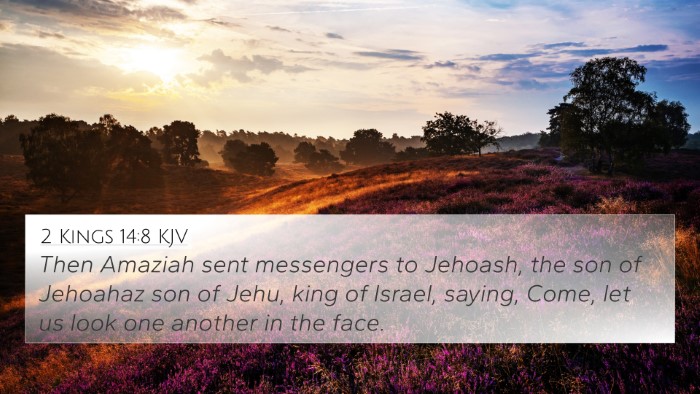Understanding 1 Kings 20:18
Verse: "And he said, If they be come out against thee, for peace, take them alive; and if they be come out against thee for war, take them alive." (1 Kings 20:18)
Summary of 1 Kings 20:18 Meaning
The verse occurs in the context of King Ahab's encounter with the king of Syria, Ben-Hadad, who laid siege against Samaria. This message is one of strategic warfare advice and reflects a broader theme of divine guidance amidst conflict.
Insights from Biblical Commentaries
- Matthew Henry:
Henry emphasizes the importance of discerning the intentions of one's adversaries. The advice given to Ahab suggests a tactic that could lead to peace, should the enemy approach with peaceful intentions. The overarching lesson highlights the need for wisdom in the face of military confrontations.
- Albert Barnes:
Barnes points out the dual possibilities presented: peace or war. The instruction reflects a pragmatic approach, where Ahab is advised to examine the motives of the Syrians before taking action. This commentary underscores the significance of understanding the underlying reasons behind an enemy's actions.
- Adam Clarke:
Clarke interprets the verse with a view towards the moral implications of victory and mercy in conflicts. He argues that capturing the enemy alive could also indicate a chance for reconciliation and the possibility of converting foes into allies, emphasizing compassion over ruthless conquest.
Comparative Analysis: Thematic Cross-References
Through the lens of cross-referencing biblical texts, we can draw parallels between this passage and other significant verses. Here are some notable relations:
- Matthew 5:7: "Blessed are the merciful: for they shall obtain mercy." - This verse reflects the importance of mercy in relations, akin to Ahab's potential path of peace.
- Proverbs 16:32: "He that is slow to anger is better than the mighty; and he that ruleth his spirit than he that taketh a city." - Highlights the virtue of restraint, resonating with Ahab's need for wisdom in warfare.
- 2 Chronicles 20:21: "And when he had consulted with the people, he appointed singers unto the Lord, and that should praise the beauty of holiness, as they went out before the army." - Reflects the importance of seeking divine counsel ahead of battle, paralleling Ahab’s experience.
- Psalm 34:14: "Depart from evil and do good; seek peace, and pursue it." - Emphasizes a proactive approach to peace, aligning with Ahab's choice in this verse.
- Romans 12:18: "If it be possible, as much as lieth in you, live peaceably with all men." - Reinforces the principle of striving for peace even in conflict situations.
- 1 Peter 3:9: "Not rendering evil for evil, or railing for railing; but contrariwise blessing; knowing that ye are thereunto called, that ye should inherit a blessing." - Suggests the value of kindness over hostility, echoing the counsel given to Ahab.
- James 3:17: "But the wisdom that is from above is first pure, then peaceable, gentle, and easy to be entreated, full of mercy and good fruits..." - This verse connects with the idea of wise leadership and temperance in conflicts.
Application in Contemporary Understanding
The spiritual insights derived from 1 Kings 20:18 emphasize discernment and strategy in interpersonal conflicts and broader warfare. The integration of mercy in decision-making can often lead to greater resolutions than sheer might. A thematic exploration of this verse calls for analysis between biblical texts and their application in life's various conflicts.
Tools for Cross-Referencing
To fully appreciate the connections between Bible verses, consider using tools such as:
- Bible concordance for thematic studies.
- Bible cross-reference guide for exploring verse connections.
- Cross-reference Bible study methods to deepen understanding of related scriptures.
- Bible reference resources to facilitate detailed exploration of narratives and teachings.
Conclusion
1 Kings 20:18 serves as a profound illustration of how biblical themes of wisdom, mercy, and strategy permeate scriptural teachings. By engaging in cross-referencing biblical texts, one can extract deeper meanings and applications that resonate in contemporary contexts. For anyone seeking to understand the connections between Bible verses, tools for cross-referencing alongside scriptural analysis provide invaluable support.







